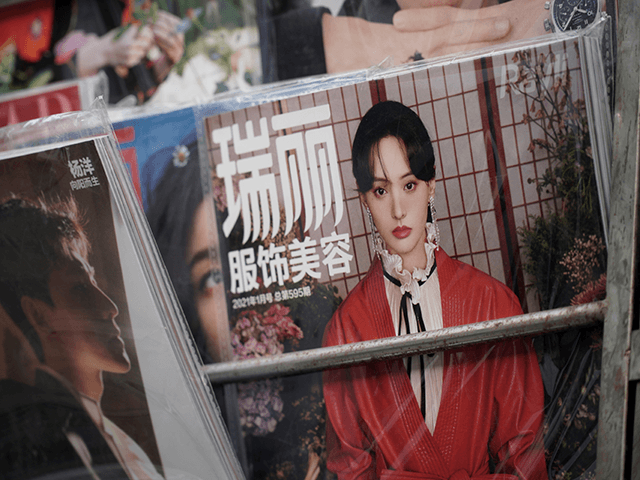The Cyberspace Administration of China (CAC) on Tuesday announced new regulations to control entertainment content, especially the sort of content that fuels rabid fan-worship of celebrities.
The CAC was especially determined to ensure that politically incorrect celebrities blacklisted by the Chinese Communist Party (CCP) never get to make a comeback.
China’s state-run Global Times unabashedly described the ban on “content that induces fans to blindly idolize celebrities, or hype the comeback of entertainers who have illegal and unethical records” as a top goal of CAC’s “negative list” – a blacklist by any other name.
The “negative list” will also ban “celebrity-related content that promotes abnormal aesthetics,” “hypes vulgar scandals,” or exposes the personal information of celebrities.
“Platforms should manage celebrity-related accounts under hierarchical management, monitor and establish warning mechanisms for accounts with a certain amount of followers. Accounts that publish biased, confusing information that provokes confrontation and manipulates public opinions should be punished accordingly,” CAC ordered.
The Global Times presented CAC’s regulations as making a pledge by Chinese Internet providers in September to “clean up vulgar online content and deny law-breaking or immoral entertainers the opportunity to come under the spotlight again” into a set of compulsory orders that would cover all media, with stiff financial penalties for disobedience.
The CCP has grown very concerned about “fan culture” over the past year, in part because some of the celebrities with highly enthusiastic followings in China are not Chinese. For example, South Korean pop singers attract plenty of superfans, and a good number of outright stalkers, in China.
The Financial Times on Tuesday predicted CAC’s new rules could obliterate Chinese fan pages for top performers with millions of followers. This would please communist officials concerned by the high degree of coordination and social activity displayed by those fans, who might someday turn their organizational skills to something more politically explosive than painting birthday messages for South Korean pop stars on private aircraft.
The Chinese government also sees fandom as an obstacle to the austere “Common Prosperity” cultural and political program launched by dictator Xi Jinping. Unsurprisingly for a totalitarian regime, the Chinese government wants Xi’s preferred values to be delivered constantly by all media.
The CAC’s regulations will make media companies very nervous about producing anything that could be seen as undermining the Common Prosperity initiative. Producers will feel much safer if they crank out Chinese nationalist propaganda.
The South China Morning Post (SCMP) on Wednesday reported three major Chinese celebrities are already on the no-comebacks-allowed “negative list,” along with 85 less well-known Internet personalities: Zheng Shuang, an actress accused of tax evasion; Zhang Zhehan, who made the mistake of posing for photos at a shrine to the warrior dead of Japan; and Chinese-Canadian pop singer Kris Wu Yifan, who was accused of sexual assault.
The blacklist described by the SCMP was the ninth edition of a “bad behavior” list compiled by the China Association of Performing Arts. Media and Communist Party figures quoted by the SCMP expected the CAC’s new regulations would give the list some teeth, as well as stepping up the CCP’s crusade to remove “effeminate men” from the airwaves and impose a “correct beauty standard” for women.

COMMENTS
Please let us know if you're having issues with commenting.